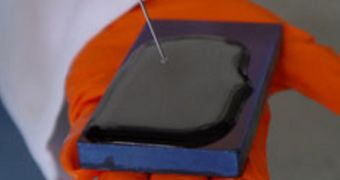A group of Swedish researchers from the Uppsala University have developed a new gel-like material, which they say can bridge the divide between medical implants and bone tissue. By adding this smart coating to surgical implants, doctors will soon be able to reduce the risk of implant rejection in patients.
Scientists also hope to use this compound as an inspiration to create a new generation of biomaterials, which would be capable of responding to stimuli inside the human body, becoming active and promoting the natural growth of tissue as a result, Chemistry World reports. At this point, experts say, implants made of metals such as titanium are attached to bones via screws and other intrusive methods.
The new gel relies on the actions of growth factors such as bone morphogenetic protein (BMP-2) to promote a more natural and compatible connection between bones and implants. This particular material features several different versions of hyaluronan, which is a rather large biological molecule. The resulting gel is then deposited on titanium implants on a layer-by-layer basis.
In a series of experiments conducted at the university, scientists determined that adding a BMP-2 solution to the gel allowed the proteins to bind to titanium much more effectively.
After washing the entire ensemble with a mixture containing calcium, it was observed that the amount of BMP-2 available for bonding was reduced, suggesting the custom implants could release calcium over prolonged periods of time, promoting bone formation.

 14 DAY TRIAL //
14 DAY TRIAL //